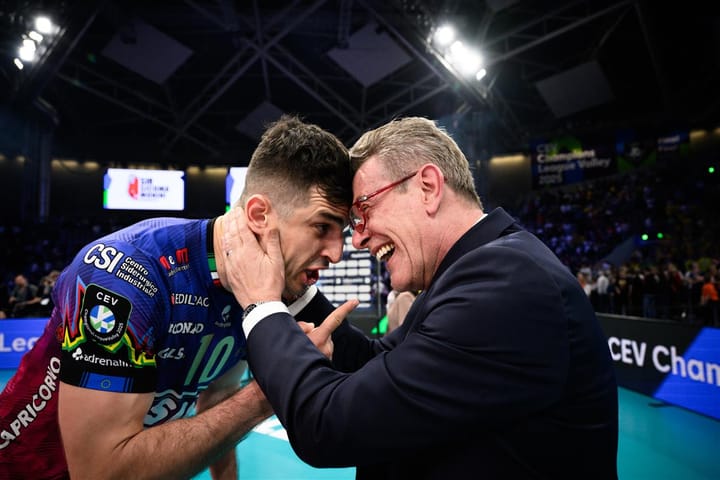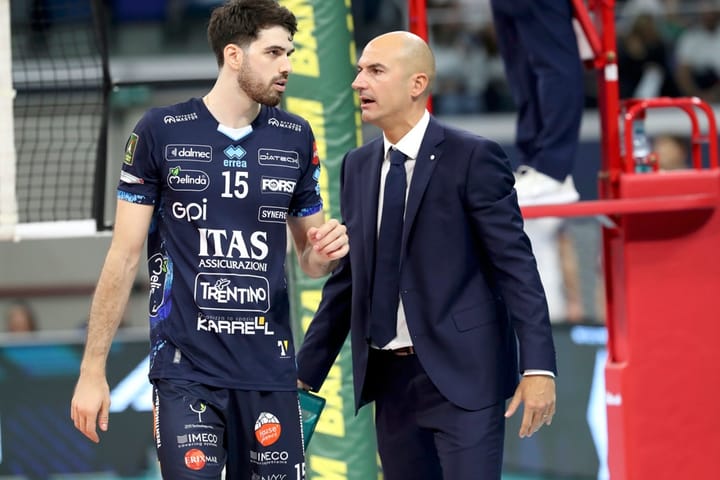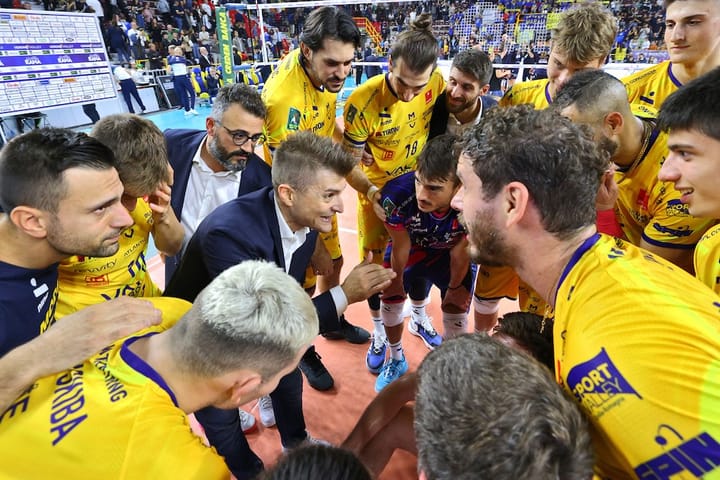84. Fabio Soli: Embracing Player Creativity (Part 1)
Fabio Soli is the head coach of Trentino Volley, one of Italy's and Europe's top pro volleyball teams.
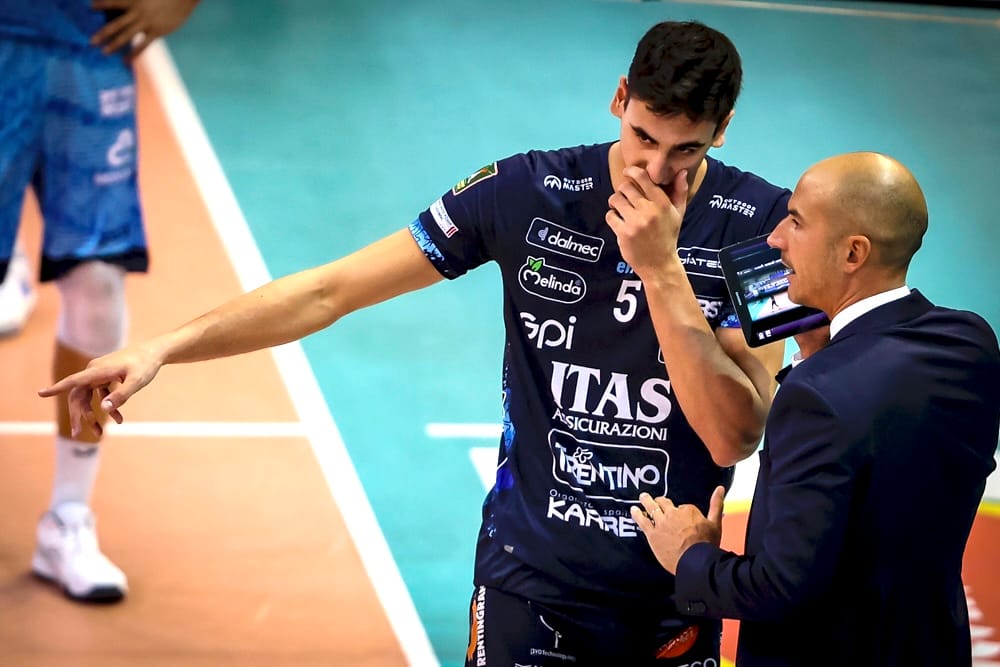
In May 2024, Trentino Volley, under the masterful guidance of coach Fabio Soli, clinched the European Champions League title with a commanding 3-0 victory over Polish powerhouse Jastrzębski.
This triumph in Europe's premier club competition, where the world's elite teams clash, marks a pinnacle in Soli's coaching journey.
Since embarking on his coaching career in 2011, Fabio has steadily ascended the ranks to now helm one of the world's top professional volleyball clubs.
Our conversation with Fabio delves into the core of his coaching philosophy, exploring:
• The crucial role of decisive coaching, even when facing potential missteps
• How the fear of errors stunts player growth in volleyball
• Striking a balance between tactical structure and player autonomy
• The enriching impact of diverse mentorship in coaching
• Nurturing players' game intelligence and on-court decision-making
• Fostering a team culture that harmonizes individual and collective growth
• Pursuing relentless improvement for both coach and team
We have 41 minutes of transcribed and subtitled interview with coach Soli in this article. Enjoy!
Enter Fabio...
Fabio, why did you commit to being a professional volleyball coach? What pushed you towards that decision?
My story is a fairly straightforward one. I was a mediocre player, which I think is very helpful to a coach. It allows you to accept that it's okay to start from the bottom, and that's where I started from.
I took my first coaching certifications in Italy because I had the opportunity and just took the courses, almost unknowingly. Then I spent two years as a pro player in Milan. I was very young and got homesick, so I came home and started playing in fairly low categories.
I hadn't enrolled in college, having only finished high school, so I was working. I was playing and working, playing and working. This gave me, in my opinion, a great opportunity to understand what things I loved to do in life.
I realized early on that by playing and working, I wouldn't be able to push either my sports or my professional career forward. At some point, I was faced with a choice: doing my passion, which was volleyball, poorly, and failing to achieve something important in a working environment.
That was putting me in a state of mediocrity that I couldn't stand.
So I asked myself: What is the thing I like to do? This is a great lesson that, even as a coach, I find myself trying to pass on to my players. What do I really like to do? What is my path? If I have to throw away the opportunity in volleyball or in working, what do I throw away? I decided to throw the work away.
So I quit my job, enrolled in the university, and studied Sports Science because I knew my life was in sports. At that point, it wasn't clear to me that I was going to be a volleyball coach. I just knew my life was in sports, my world was sports. I've always liked to try different sports than volleyball as well. Even in enduring physical fatigue, I found great pleasure.
I basically oriented my life toward sports. I graduated with a master's degree after five years. That's when I started looking for opportunities in soccer and other places where I could find a chance to squeeze in.
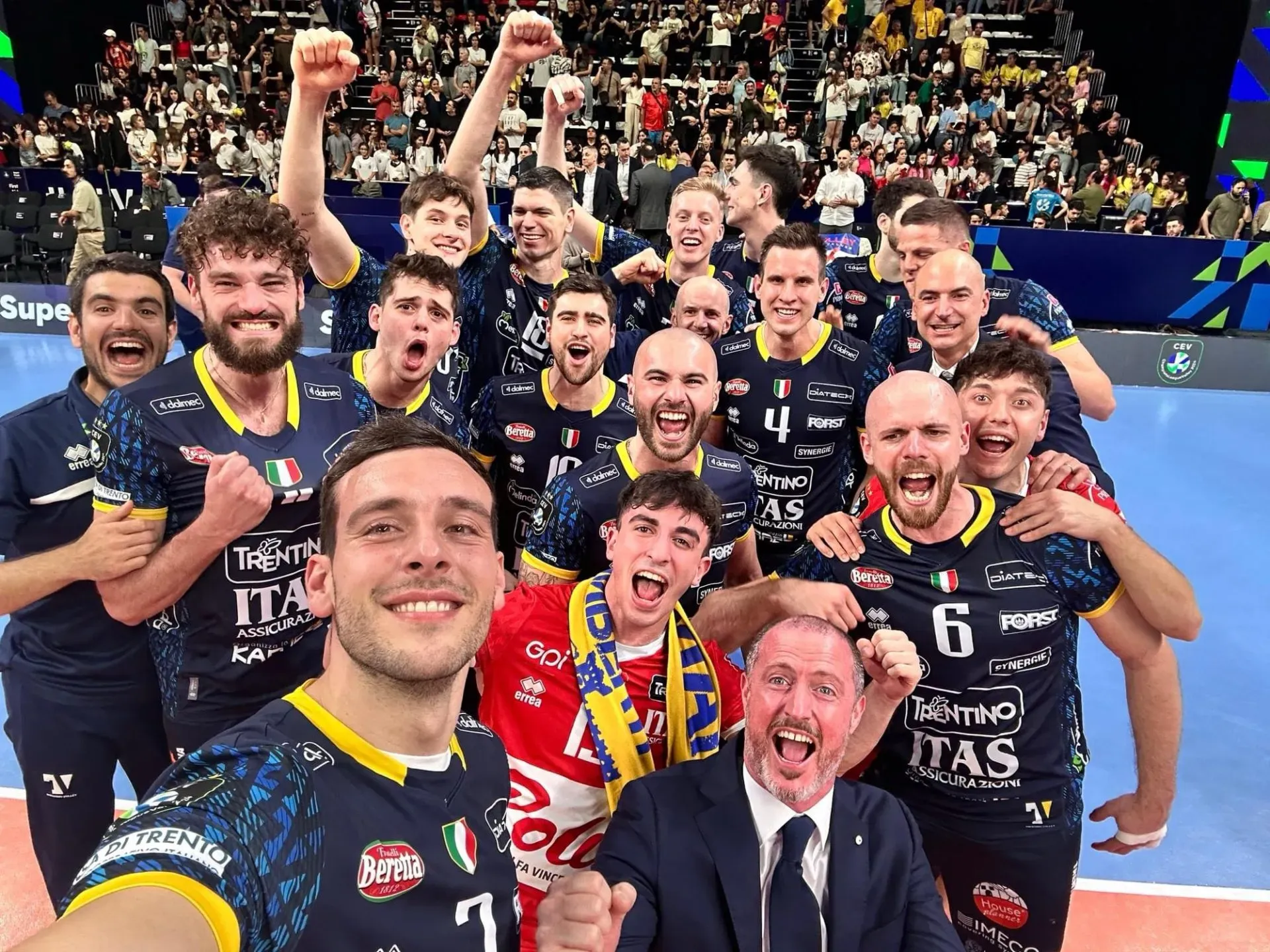
This moment in my life coincided with an opportunity to help out Modena. They had Silvano Prandi as their coach, and Modena needed an extra assistant coach.
Silvano had Camillo Placi as his second coach. Between the two of them, they were missing somebody younger in the gym. They were very skillful in everything that was game preparation, but they needed a helping hand in the gym.
I was young and still playing when they made me this proposal, and I took advantage of it. I no longer had the physical freshness to continue my commitment to play, so I quit playing and started a coaching career in my favorite sport: volleyball.
The choice to focus on sports was not a choice to focus directly on volleyball initially, but from there, I had the great fortune of working with Modena and Silvano.
After that, I ended up in Turkey with Daniele Bagnoli. When they exonerated Daniele, I became the head coach for half the season. The next year, Daniel Castellani came, and I stayed there with him. I was fortunate enough to be in the game and watch great masters. This gave me so much from a curriculum perspective - all that knowledge and experience from three completely different people.
This is a piece of advice to those who ask me what they should do:
If you can, learn from capable people, but choose mentors who are different from one another.
This way, you'll see different approaches and different worlds with different eyes.
Then the desire grew to start as a head coach. I had been an assistant for several years for all these very capable people. And I said to myself, "I want to try it." Just like when I chose to quit my job, I put everything on the scale and asked, "What do I want to do? Do I want to be a head coach?"
I didn't look at the economic conditions or at being away from home. I launched myself into following my pure instinct. When you work in a field that you are passionate about, instinct is a little voice that should always be listened to.
I listened to it and did two years in A2, then went to Ravenna, then Monza, then Cisterna. After being exonerated from Cisterna, I rebooted again. And now I'm at Trento.
What you said about decision-making is very important. Having the ability to decide. Being able to make your own decisions. Because you don't see things as they really are.
It is complicated.
I consider myself a fairly pragmatic person. I like to live by emotions, however, I think I have a fine critical capacity. Choosing between things on either side of the scale between the things that are worthwhile and things that are not worthwhile, it's something I can do quite well.
One thing I'm learning still however is the actual ability to choose. Choosing even at the risk of not getting the result.
That is a skill that I am still slowly developing and acquiring. To be able to not only make the accumulation of positive things, the accumulation of the negative things and say okay, then let's go toward that direction. Since what I have chosen, what I have examined takes me that way. That I can do.
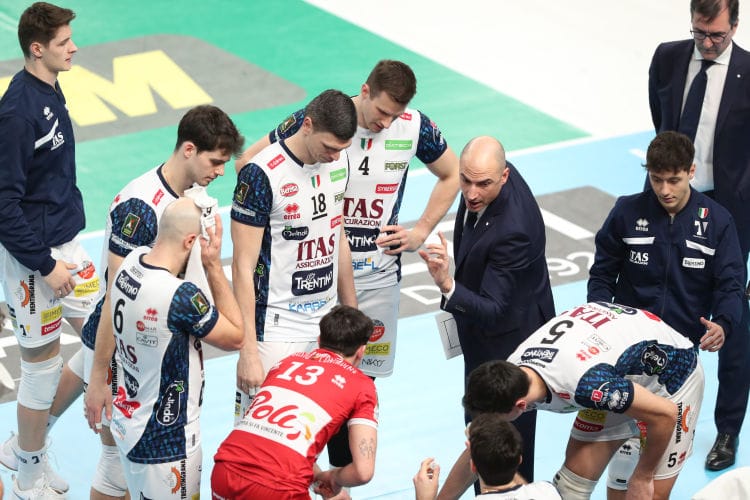
That special ability to actually choose, to say okay, given these things here, let's go that way, it's something that in my opinion is learned through experience. Much more than just by talent. The ability to actually choose in my opinion is something that is acquired. The talent of sniffing out what things are, so evaluating what are the positive or negative things, in my opinion, are more of a talent.
The actual ability to choose is something I think is so fundamental.
Not only for those who are coaching. Also for the players who train in the gym. Or for the work that you do. Even if it means that you'll fail. But that capacity is most important. Much more than the result you'll get. Which can be negative or positive.
And it may not even depend on you.
What advice would you give yourself as a starting coach? An advice that is so clear and logic for you now, but that you had to develop over the years.
Make your own choices. Make your choice and make mistakes. Learn from your mistakes. But make your choice with great serenity, because our role requires that.
'Not making decisions' has a high cost, not only for ourselves but also for the group we're leading. The inability to choose, standing still without making a decision is not the way to go.
Not making a decision is exactly the same as always making the wrong choice.
In a guidance role towards players who are much younger - I'm not, however, there's starting to be a generational gap of 15, 20 years between me and the guys I coach - it puts them in a position of not recognizing themselves in you anymore.
Therefore, they go and look elsewhere to find another reference point.
Trentino winning the Champions League
So the most important advice I'd give myself is to make the choice. Choose. Make a mistake. Be okay with it. Know that there are always a wide range of possibilities, counter-analyses, and other choices to counterbalance perhaps a less-than-perfect choice you've made before.
Also, always put a question mark behind your ideas. This isn't the same as being insecure, but it's about your willingness to change.
